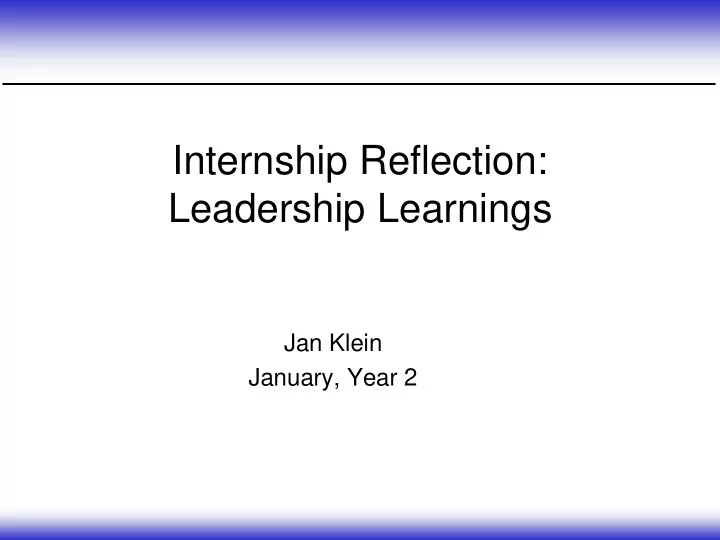

Internship Reflection: Leadership Learnings Jan Klein January, Year 2
A Two Year Journey Summer Fall IAP Spring First Year Tiger/Dragon Teams Organizational Universe Within Plant Tour Processes Leadership Sloan Leadership Leadership Debrief Communications Electives Foundations Learning LGO Leadership SIP Workshops Personal Leadership from SYs & Ethics Seminar Development Plan Internship Prep SIP Workshops Leadership Journals LGO Committees and Activities LGO ProSem - Leadership Speakers Fall Summer IAP Spring Second Year Leading in Today’s Internship Internship Global Environment Reflection Leadership Webcasts and Coaching Cross Class Tiger Teams Exchange Cross Class Exchange LGO Seminar – Leading from the Middle Core Elective Practice Field 2
Leadership Development Skill development Tools/ Frameworks Knowledge Results Reflection Practice
Today • Review cohort feedback from 360 leadership assessment • Internship learnings via crucibles – Analyze use of impression management techniques • Overview of 15.317 part 2 (H2)
Internship Leadership Assessment Survey • 32 completed the self-assessment • 37 received feedback from others – 31 received feedback from managers – 17 received feedback from peers – 4 received feedback from direct reports – 16 received feedback from customers – 26 received feedback from LGO/Sloan team • 44% of feedback came from LGO/Sloan
Pre-LGO vs. End of Internship: Self Assessment
Pre-LGO vs. End of Internship: Self Assessment
Pre-LGO vs. End of Internship: Feedback from Managers/Supervisors
Most Improved Behaviors (change >.25) Self Manager
Areas for Further Development (<3.50) Self Assessment Post Internship
Discussion Points • Do these trends resonate for you? • What is missing? • What does it imply concerning your leadership development needs? – Things we can do in the classroom? – Things you can do this semester? – Things you should do post graduation?
Learning to Lead Experience Preserving • self-insight • perspective • coaching Meaning Crucible Adapted from W. Bennis & R. Thomas, Geeks and Geezers , 2002
Impression Management
Impression Management Strategies • Self-Promotion – Seek to be viewed as competent by touting abilities and accomplishments • Ingratiation – Seek to be viewed as likable by flattering others or doing favors for them • Exemplification – Seek to be viewed as dedicated by going above and beyond the call of duty • Intimidation – Seek to be viewed as intimidating by threatening or bullying others • Supplication – Seek to be viewed as needy by showing weaknesses or broadcasting limitations
Internship Reflections • In Triads, share an internship crucible – Did you see it coming? If so, why/how? – Did you use impression management strategies and, if so, was it effective? – What is your key leadership take-away from the experience? – What can you do to prepare yourself for future crucibles?
Research on Impression Management • Self-monitors (people who are sensitive to appropriateness of projected image & ability to change behaviors to fit situation) favor positive impression management strategies: Ingratiation, self-promotion and exemplification • Supplication and intimidation are likely to have negative repercussions • Women tend to be less aggressive in using impression management • Machiavellians (individuals who are manipulative) use all strategies indiscriminately
15.317 • 12 units over two years – “T grades” last summer for initial units • Grading – class participation (40%) – internship & reflection papers (20%) • internship stakeholder analysis • internship challenges discussed at Midstream • 3 lens analysis – leadership paper – due May, Year 2 (40%) • 5 page (max) reflection on your personal leadership take- ways from your internship and your two years in LGO
15.317 Format • In-class exercise • Guest speakers • Personal case histories (structured leadership lab) – the context (i.e., organizational setting) – the leadership challenge – small group discussion around what others would do in such a situation – recommendations from the small groups to the presenter – what happened • Reflection
15.317, Spring 2011 Roadmap Session 1 A Different Lens on Leadership Session 2 Leadership Fears Session 3 Leading Diverse Stakeholders Session 4 Ethical Dilemmas Session 5 Leading Change Session 6 Looking Back Over The Past Two Years
Leading from the Middle
MIT OpenCourseWare http://ocw.mit.edu 15.317 Organizational Leadership and Change Summer 2009 For information about citing these materials or our Terms of Use, visit: http://ocw.mit.edu/terms.
Recommend
More recommend